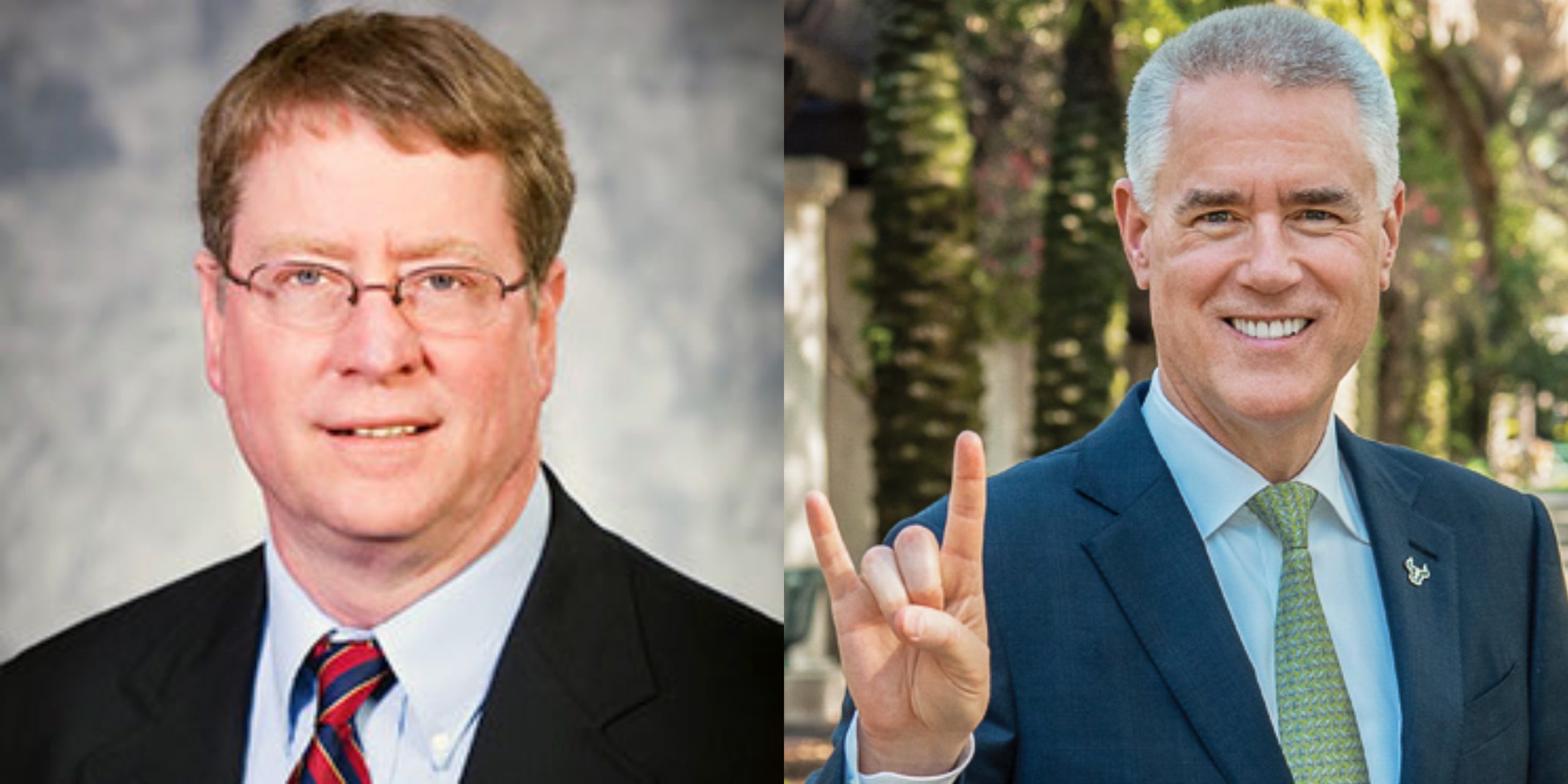Pictured Above: USF Faculty Senate President Tim Boaz (left), who moderated the forum, struggled to get a precise answer from President Steve Currall and other administrators on how “faculty futures” will be decided on the branch campuses.
Courtesy of USF
By Nancy McCann

Courtesy of USF
USF will have to consider faculty layoffs and make other painful choices to meet the COVID-19 budget crisis, but one option is off the table.
“No, we’re not considering eliminating athletics,” President Steve Currall said Friday.
His comment came during an online forum for faculty and staff at a time of palpable anxiety over a state mandate to cut the university budget by $36.7 million this year, with further reductions likely in 2021-2022.
One forum participant wanted to know if USF is “considering eliminating costly athletics activities such as football and realigning those funds” toward academics.
“We believe that intercollegiate athletics is an important part of the culture of the university,” Currall replied. “It gives opportunity for many young people, student athletes, to get access to higher education. It is beneficial in terms of our visibility and brand building, which then benefits . . . our applications at the undergraduate level.”
He also said it’s a “very important way to engage with” alumni and donors.
Currall’s emphatic assertion was one of the few precise answers that he, Provost Ralph Wilcox and other administrators offered during the 90-minute session.
Instead, they talked in more abstract, and sometimes ambiguous, terms about potential faculty layoffs – the dominant theme of the many questions that were submitted – and the process and timeline the administration will follow in making important decisions.
One participant asked how “faculty futures” will be decided at USF St. Petersburg and USF Sarasota-Manatee, the branch campuses.
“We are neither fish nor fowl,” the question said, referring to the consolidated university’s organizational and budget structure for departments. “Are we considered part of our Tampa departments . . . or are we units of ourselves on our campuses with local campus leadership making (layoff) decisions alone?”
Tim Boaz, president of the consolidated USF Faculty Senate and moderator of the forum, was reading aloud questions that were submitted in a chat box. He struggled to get a concise answer from the university’s leaders.
First, Wilcox replied that “faculty, regardless of the geographical home campus, are members of an academic department and an academic college” in one university and “their voices must be heard.”
Then Currall added that St. Petersburg and Sarasota-Manatee are “important” and “unique” and the consolidated university “is much stronger than we were before.”
Boaz attempted to clarify the question.
“These faculty are in (university-wide) colleges, but (employed) on the branch campuses, and I think there’s some confusion as to which of those (budget) cut targets is likely to affect their reality,” Boaz said. “So, could you clarify that a little bit?”
The person who submitted the original question chimed in (from the chat box): “What I want to know is whether St. Pete or S-M leadership will be deciding alone which faculty might be laid off . . . . Please phrase so that they follow the question.”
Boaz tried again.
“I think that part of the concern has to do with the elimination of programs and the identification of a layoff unit,” Boaz said.
Wilcox said that “academic membership of a unit can indeed transcend campuses and, therefore, budget appropriations.”
USF General Counsel Gerard Solis said that if a department has faculty on all three campuses, “then you would apply the criteria in the CBA (collective bargaining agreement) across those faculty members . . . regardless of which campus those faculty members” are on.
When Solis asked if that answered the question, Boaz said, with a pause, “I think that’s – yes.”
Another forum participant had doubts about transparency and USF’s Principles of Community, the guidelines established by the Currall administration that stress “justice, accessibility and meaningful participation” by all members of the university community.
“The Principles of Community call for transparency. There was no transparency with the decision to close the College of Education,” Boaz read from the question in the chat. “Violating the Principles of Community erode trust. Can we be assured that going forward there will be transparency?”
Currall didn’t address what many considered an egregious exclusion of university faculty and administrators – and the community – before announcing the decision on Oct. 14 to eliminate the College of Education and create a school of education for graduate students.
“This session today is part of the transparency . . . we are redoubling our efforts to be even more transparent and accountable,” Currall said.
He also announced that the university has a new website on what it calls “strategic realignment” that includes a timeline and work flowchart.
One participant wanted to know when the faculty will “find out about layoffs” and when they would be notified.
Solis said the university would be working with the union – United Faculty of Florida – as dates are developed. He said the collective bargaining agreement has “established time periods” associated with layoffs.
Wilcox said faculty layoffs might be a two-year process.
“If indeed there’s the necessity for faculty layoffs in year one, we will, of course . . . comply with the collective bargaining agreement,” he said. “But there may be other layoffs that don’t have to occur until fiscal year 2022, which will provide those affected with a longer period of planning for future employment.”
Boaz said at the end of the forum that about 150 questions didn’t get answered. Only 11 were discussed.
Although Currall said that the university has no intention of eliminating athletics, the Athletics Department has already announced cuts that will save an estimated $2.5 million.
It said that it will lay off 30 staff members and impose salary cuts or furloughs for the remaining salaried staff members.
Football coach Jeff Scott, men’s basketball coach Brian Gregory and Michael Kelly, the vice president of athletics, are taking 15 percent salary cuts.



